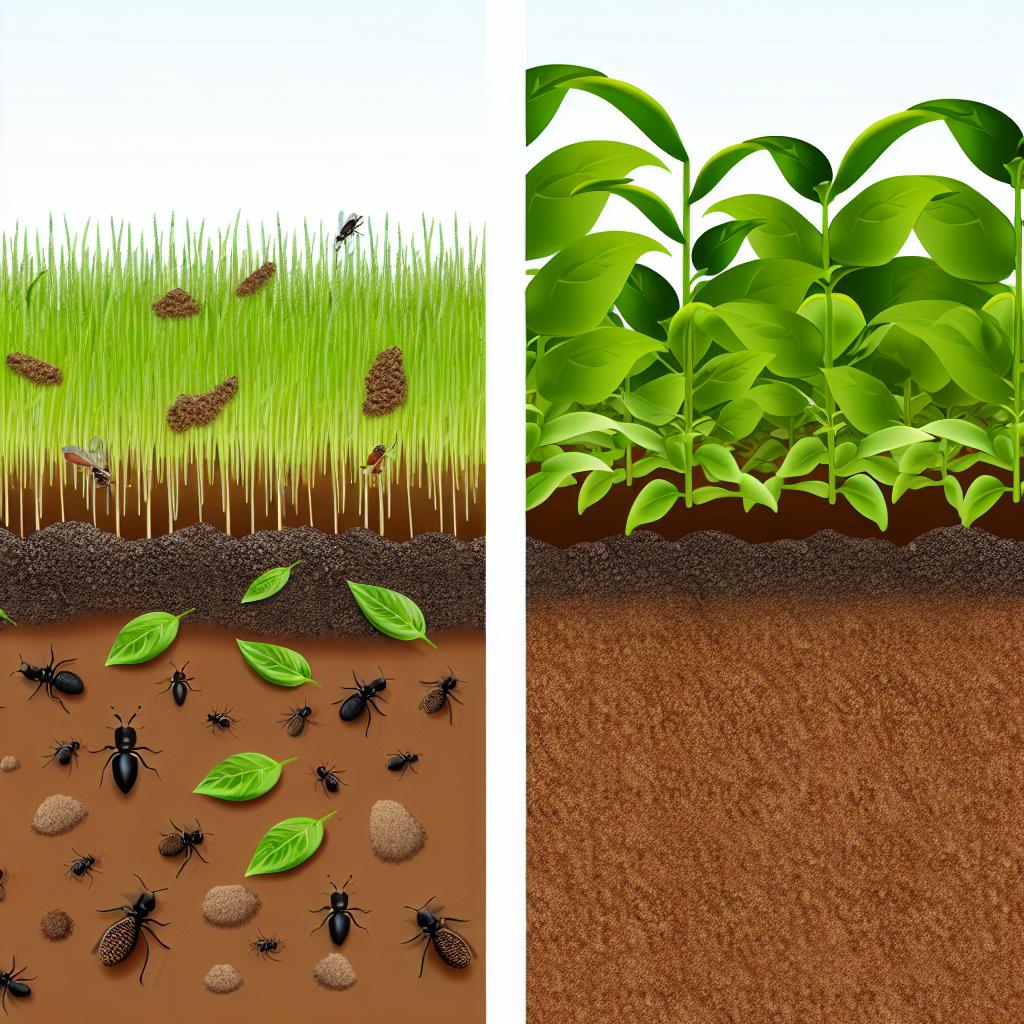Are you a gardener or farmer looking to maximize the health and productivity of your soil? The debate between organic and synthetic fertilizers has been ongoing for years, with passionate advocates on both sides. In this article, we’ll explore the benefits and drawbacks of each type of fertilizer, and help you determine which option is best for your specific soil and crop needs. Whether you’re a seasoned pro or just starting out, understanding the differences between organic and synthetic fertilizers is crucial for achieving the best results in your garden or farm. Let’s dig in and find out what’s best for your soil!
Table of Contents
- Organic Fertilizers: Nourishing Your Soil Naturally
- Synthetic Fertilizers: Boosting Soil Productivity with Chemicals
- Comparing Nutrient Content: Understanding the Differences
- Environmental Impact: Making Sustainable Choices for Your Garden
- Choosing the Right Fertilizer for Your Soil: Tips and Recommendations
- Q&A
- In Summary

Organic Fertilizers: Nourishing Your Soil Naturally
When it comes to nourishing your soil, organic fertilizers offer a natural and sustainable solution that promotes healthy plant growth. Unlike synthetic fertilizers, organic options are derived from natural sources and provide a range of benefits for your soil and plants. Here’s a closer look at the differences between organic and synthetic fertilizers, and why organic options may be the best choice for your soil.
**Benefits of Organic Fertilizers:**
- Improve soil structure and texture
– Enhance soil fertility and nutrient levels
– Promote beneficial microbial activity
– Reduce the risk of soil erosion and nutrient runoff
– Support long-term soil health and sustainability
**Drawbacks of Synthetic Fertilizers:**
– Contain high levels of chemicals and salts
– Can harm beneficial soil organisms
– Increase the risk of nutrient leaching and pollution
- Contribute to soil degradation and long-term fertility issues
In summary, organic fertilizers offer a natural and environmentally-friendly way to nourish your soil and promote healthy plant growth. By choosing organic options, you can support the long-term health and sustainability of your soil while minimizing the negative impacts associated with synthetic fertilizers.

Synthetic Fertilizers: Boosting Soil Productivity with Chemicals
Synthetic fertilizers have been widely used in modern agriculture to boost soil productivity and increase crop yields. These chemical-based fertilizers are formulated to provide plants with essential nutrients, such as nitrogen, phosphorus, and potassium, in readily available forms. While synthetic fertilizers have their benefits, there is an ongoing debate about their long-term effects on soil health and the environment.
When considering the best option for your soil, it’s important to weigh the pros and cons of both organic and synthetic fertilizers. While organic fertilizers are derived from natural sources and promote soil health and biodiversity, synthetic fertilizers offer immediate nutrient availability and precise nutrient ratios. Understanding the differences between the two can help you make an informed decision for your soil and crops.

Comparing Nutrient Content: Understanding the Differences
When it comes to choosing the right fertilizer for your soil, it’s important to understand the differences between organic and synthetic options. Both types of fertilizers have their own unique nutrient content and benefits, so it’s essential to compare them to determine which is best for your specific soil needs.
Organic fertilizers are derived from natural sources such as compost, manure, and bone meal. They contain a variety of essential nutrients, including nitrogen, phosphorus, and potassium, as well as micronutrients like calcium, magnesium, and sulfur. On the other hand, synthetic fertilizers are manufactured using chemical processes and typically contain higher concentrations of specific nutrients. They are often formulated to deliver a precise balance of nutrients to plants, making them a popular choice for commercial agriculture.
When deciding between organic and synthetic fertilizers, it’s important to consider factors such as nutrient availability, environmental impact, and long-term soil health. While organic fertilizers provide a slow-release of nutrients and improve soil structure, synthetic fertilizers offer quick nutrient uptake and can be tailored to specific plant needs. Ultimately, the best choice for your soil will depend on your individual gardening goals and environmental considerations.

Environmental Impact: Making Sustainable Choices for Your Garden
When it comes to choosing the right fertilizers for your garden, it’s important to consider the environmental impact of your choices. Organic and synthetic fertilizers both have their pros and cons, but making sustainable choices for your garden can help minimize the negative impact on the environment. Here’s a breakdown of the differences between organic and synthetic fertilizers, and how they can affect your soil and the environment.
**Organic Fertilizers:**
– Made from natural ingredients such as compost, manure, and bone meal
– Slow-release nutrients that improve soil structure and fertility over time
– Reduce the risk of chemical runoff and water pollution
– Support healthy microbial activity in the soil
**Synthetic Fertilizers:**
– Made from chemical compounds that provide quick-release nutrients to plants
– Can lead to soil acidification and nutrient imbalances over time
– Runoff from synthetic fertilizers can contribute to water pollution and harm aquatic ecosystems
– May require more frequent applications compared to organic fertilizers
By choosing organic fertilizers for your garden, you can promote healthier soil and minimize the environmental impact of your gardening practices. Consider using compost, manure, or other natural fertilizers to support sustainable gardening and reduce your carbon footprint.
Choosing the Right Fertilizer for Your Soil: Tips and Recommendations
When it comes to choosing the right fertilizer for your soil, there are a few key factors to consider. One of the biggest decisions you’ll need to make is whether to use organic or synthetic fertilizers. Both options have their own set of benefits and drawbacks, so it’s important to weigh them carefully before making a decision.
Organic fertilizers are derived from natural sources, such as compost, manure, or bone meal. They are generally considered to be more environmentally friendly and sustainable, as they promote soil health and microbial activity. Additionally, organic fertilizers release nutrients slowly over time, providing a steady and long-lasting source of nourishment for your plants. On the other hand, synthetic fertilizers are manufactured using chemical processes and are designed to deliver nutrients to plants quickly and efficiently. They are often more affordable and easier to apply, but they can also have negative impacts on soil health and the environment if used improperly.
When deciding between organic and synthetic fertilizers, it’s important to consider the specific needs of your soil and plants, as well as your own gardening practices and values. Ultimately, the best choice for your soil will depend on a variety of factors, including the type of plants you’re growing, the condition of your soil, and your personal preferences. By carefully weighing the pros and cons of each option, you can make an informed decision that will promote healthy growth and thriving plants in your garden.
Q&A
### What are the main differences between organic and synthetic fertilizers?
### How do organic fertilizers benefit the soil?
### Are there any drawbacks to using organic fertilizers?
### What are the advantages of using synthetic fertilizers?
### How do synthetic fertilizers affect the environment?
### Can a combination of organic and synthetic fertilizers be used for optimal soil health?
### What factors should be considered when choosing between organic and synthetic fertilizers for your soil?
In Summary
In conclusion, the choice between organic and synthetic fertilizers ultimately depends on your specific soil and plant needs. Both types have their own benefits and drawbacks, so it’s important to consider factors such as cost, environmental impact, and the overall health of your soil when making your decision. By understanding the differences between the two and considering the unique needs of your garden, you can make an informed choice that will help you achieve healthy, thriving plants and soil. Remember, the key is to always prioritize the long-term health and sustainability of your garden. Happy gardening!

